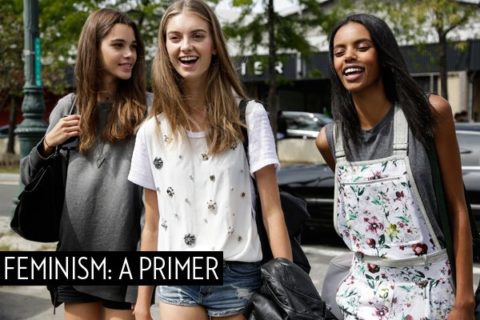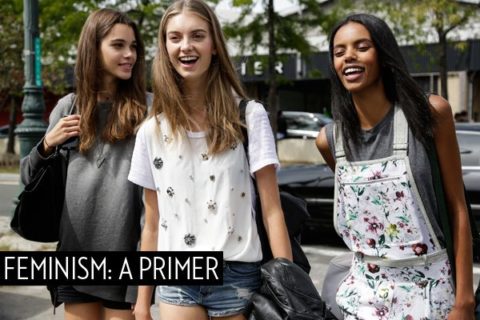Get smart on feminism fast: A beginner’s guide to female equality


Feminism, where to start? Lately, you’ve heard the word tossed around like a Kardashian wedding gone viral. From actress Emma Stone calling out boyfriend Andrew Garfield for a sexist remark on live television, to Shailene Woodley‘s widely-publicized remarks about not classing herself as feminist—but what does it all mean? How and why should feminism affect you?
We’ve compiled a swift five-point guide so you can get clued up and tuned into the fourth wave of feminism (and that is not a euphemism for your period.) Surf that sea of female equality sister!
1. Feminism isn’t a moth-eaten dress from a bygone era
From sex trafficking and violence to unequal pay and a denial of education, these are only some of the issues faced by women globally. Even in a highly developed country such as Canada, women are subject to street harassment; lesser pay (at approximately 30%), facing arrest for bare boobs and we are falling behind other countries when putting women on corporate boards. First Nations women are also subjected to further discrimination compared to their non-aboriginal counter parts, merely because they are aboriginal. Is this the world we want our daughters and sons (because it affects them also) to grow up in? Probably not.
The fourth wave has moved feminism into the online sphere making it easier and more accessible than ever to get access to help, events and information on gender issues. As a result, feminism has given birth to innovative, safety devices like the YWCA Canada Safety Siren App. The App has a utility siren activated by pressing a safety button that sends a pre-set email to your emergency contact with approximate coordinates. It also makes an emergency outgoing call to a pre-programmed number allowing someone to be notified immediately in the event of an incident. Hollaback, an international movement with locations across Canada, also has an App that allows users to share their story and learn how to respond to harassment. Both Apps are available at the App store on iTunes.
For femspiration on your Twitter feed, check out author and Guardian US columnist @JessicaValenti or have a giggle at the cheeky slant on Taylor Swift’s questionable song lyrics over at @FeministTaylorSwift or for fighting social injustice and smashing patriarchy, @feministhulk will leave you feeling empowered. Your lunchtime reading list could also include: Whoneedsfeminsim.tumblr.com, Girltalkhq.com, Blackfeminists.org and Feministing.com. All guaranteed to give you something to think about.
2. Your boobs are an issue
In New York, you can whip ‘em out and not be banged up in prison for indecent exposure or lewd behaviour as the law allows both men and women to go shirtless. See The Outdoor Co-ed Topless Pulp Fiction Appreciation Society as an example. However, Canada is slightly trickier and still vastly unclear. While one province in theory, such as Ontario, may allow the ladies to let the mammary glands loose in certain places (due to an acquittal in the R.v.JACOB, 1996 case), another, like Saskatchewan, might not, as the Supreme Court of Canada hasn’t determined what its position is on bare boobies. So until then Canadians have to support their stateside sisters, such as Scout Willis, daughter of Demi Moore, who proudly presented her baps on a mission-led stroll around New York in retaliation of Instagram’s ban on images showing women’s nipples and in support of the Twitter #FreeTheNipple campaign. Rumour, Scout’s sister, is supporting the campaign with the “Everybody’s Gotta Eat” drive which is aiming to help make women feel comfortable about breastfeeding in public, because if you weren’t already aware, feeding your child is actually a problem for some people. Funny, eh?
3. You can dress however the hell you like
Miniskirts, push-up bras and itsy-bitsy bikinis; however much or as little as you choose to wear, it does not give men the green light to do as they please. Likewise with make-up, whether it’s a full-face or a bare one; your visual aesthetic does not give consent to a sexual exchange. It’s only your mouth that communicates this if you want to say yes. However, there is still a false notion that women who are raped “ask for it” because of the way they are dressed and this is simply not true; whatever your age, looks or background, you are not raped because of how attractive you are or how little you wear. It’s an aggressive, pre-mediated motivation not a sexual one. SlutWalk, started in Toronto, is a grassroots movement gone global in over 200 countries and it has been battling victim blaming through organized marches and protests since 2011. The next Toronto rally date is July 12! See you there.
4. Men can be the solution
Contrary to some people’s belief, being a feminist isn’t just a “woman’s thing.” In Canada, a woman is raped every 17 minutes, over 80% of sex crime victims are women and 57% of aboriginal women have been sexually abused; with stats like these shouldn’t the focus really be on men and their behaviour and not on what a women should or shouldn’t be doing to prevent a man’s actions?
Anti-violence educator Jackson Kazt gives a great Ted Talk on how violence against women is a man’s issue, and not just because these victims could easily be their mother, sister or aunt. Men are asked to stand alongside women, speak up for women and not be passive bystanders because their positive actions can help bring about a necessary change. Also, it benefits them too. Non-profit organisation Plan Canada says both boys and girls have a better chance in life when their mother is educated and boys, as well as girls, can also be held back because of rigid gender roles. Isn’t that a good enough reason for men to get on board?
5. There are so many female figures to drool over (for the right reasons)
Prominent writers, political figures, business moguls and philanthropic fanatics, there are a multitude of women, past and present, excelling in male dominated industries, standing up for women’s rights and proving that women are just as, and if not more so, as good as men: Margaret Atwood, Bonnie Brooks, Stella Browne, Professor Germaine Greer, Rosemary McCarney, Oprah, Dolly Parton, Sylvia Plath, Maggie Thatcher, Virginia Woolf and many more.
But it doesn’t matter how old you are or if you’re famous or whatever you situation is, because being shot in the face for speaking out against the Taliban and their notorious restrictions on female education didn’t stop a then 14 year-old Pakistani schoolgirl Malala Yousafzai from bouncing back and going to town on their sorry asses with a roll call of incredible achievements. Here is a reminder: She was on the cover of Time magazine as one of “The most 100 influential people in the world,” she set up The Malala Fund, has addressed the UN regarding worldwide access to education and the Government of Canada has announced its intention that the Parliament of Canada give Honorary Canadian Citizenship to Malala. Oh, and she also has a variety of awards and an honorary degree. She can’t stop, she won’t stop and she’s only 16 years old.







